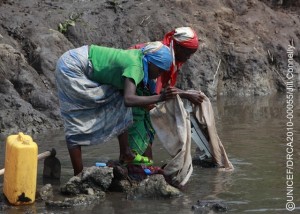UN Agencies warn that cholera epidemic is spreading in West Africa "Fatality rate especially high in some countries"
2012-09-05
DAKAR/ BRAZZAVILLE/ HONG KONG, 5 September 2012 – The World Health Organization (WHO) and UNICEF, are warning that the current cholera emergency in West Africa is set to get much worse as rains and floods create the conditions for the disease to spread faster and further.
 |
The number of new cholera cases has been made worse this year in some of the most affected countries by exceptionally heavy rains that have flooded shanty towns in some urban centres.
The number of cases so far this year in West and Central Africa is 34 per cent more compared to the same period in 2011, and represents a deteriorating trend as many more can be expected in the rainy season. In the region fatality rates can range up to eight per cent, which is unacceptably high.
"Urgent action needs to be taken in critical areas to help stop the spread of this disease," said WHO Regional Director for Africa, Dr Luis Sambo. "Governments need to declare emergency early so as to benefit from the necessary technical and other support of partners. Just as crucial are better surveillance and cross-border collaboration between health authorities.”
 |
 |

"Public health measures must become much more of a priority for governments," said Manuel Fontaine, the Acting UNICEF Director for West and Central Africa. "We are now seeing children and their families falling prey to a disease that is avoidable. WHO, governments and agencies such as ourselves are mounting an emergency response. But we need to see investment so that when a mother gives a child a drink she doesn’t wonder if it will kill."









